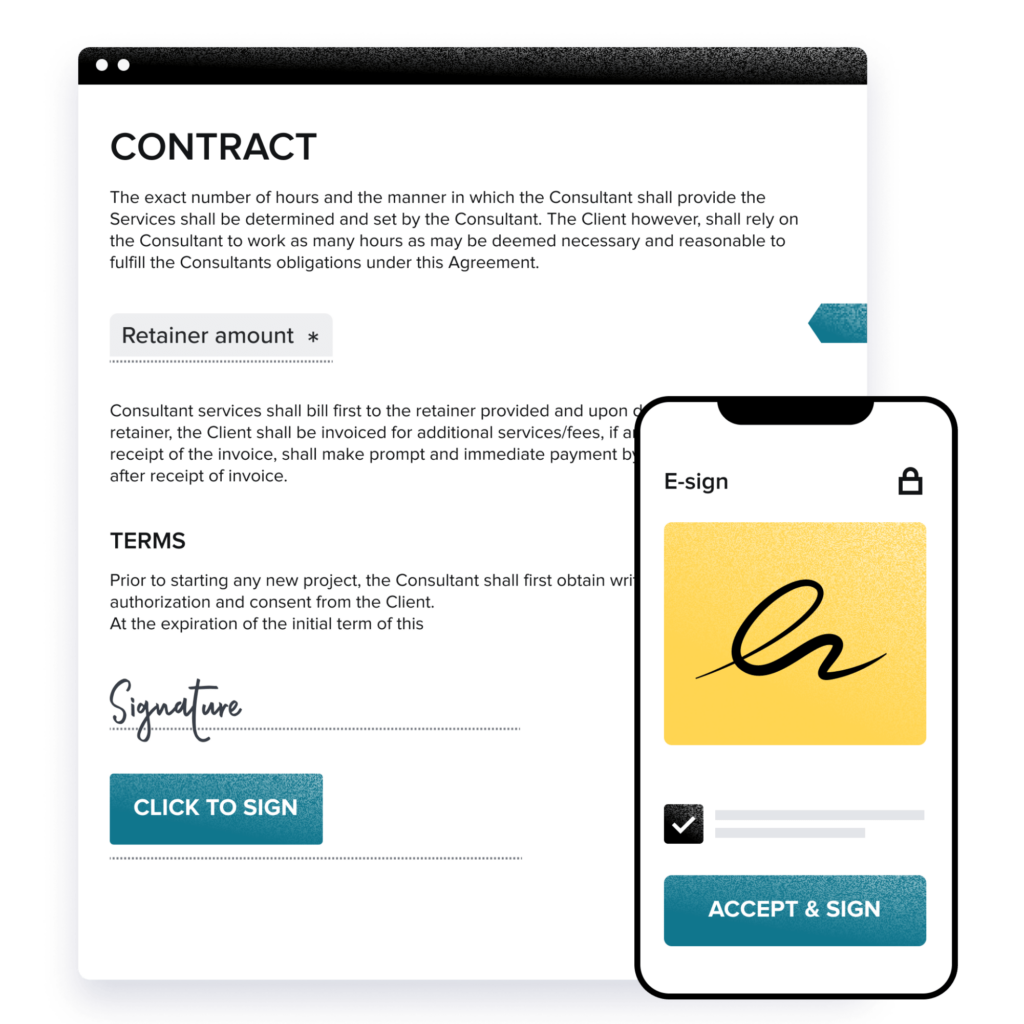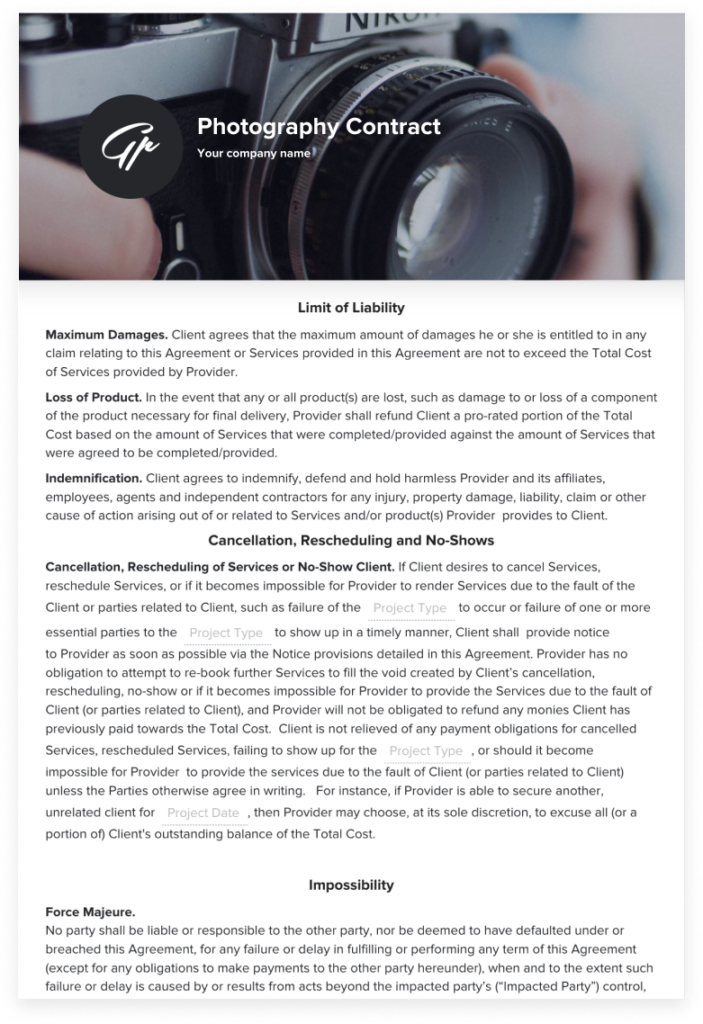Business contracts are legally enforceable agreements that provide security for all parties, including business owners, clients, vendors, and more. In this comprehensive guide, learn how to draft and review contracts, ensure your clients sign promptly, and provide a professional experience.

A business contract is a legally binding agreement between parties. For example, independent business owners may have an agreement to perform a service for a client, which all parties agree to before the service is performed.
The business contract will lay out the scope of the service, set up payment details, and include a variety of clauses that protect the business owner. After the business owner has their lawyer look over the contract to make sure it is both legally binding and favorable for the business, the client can review it as well.
If you’re a service provider with clients, you’ll need to know the different types of contracts out there, how to create legally sound contracts, how to enforce them, and how to make the signing process a good experience for your client. Use these contract best practices for independent business owners.
📍Explore more on contracts:
General tips
- How to create a contract for your independent business
- 10 essential elements of a contract
- How to sign a contract online
- What should go into a client contract?
- How to create and use a contract for services
- How to respond when a customer wants to cancel their contract
- How to protect your business with HoneyBook contracts
Types of agreements
Contract clauses
Jump to:
- Types of business contracts for independent business owners
- The basic elements of legally-sound business contracts
- Essential contract clauses for businesses
- Your contract checklist from drafting to signing
- FAQs about business contracts
Types of business contracts for independent business owners
As a business owner, you may come across many different types of contracts and agreements for your business relationships. You may hear people refer to these documents differently, so getting a sense of common contracts and their purpose can be a big help when you’re figuring out what you need or what a client is providing to you.
Independent business owners may come across everything from a one-page document to a pages-long service agreement. Your requirements for each client engagement will impact the kind of business contract you need. Here are some common contracts for businesses:
- Nondisclosure agreements (NDAs): NDAs are specific contracts wherein one or both parties agree not to disclose certain sensitive information that is part of the relationship.
- Service or business contracts: These are typically foundational contracts for a new service relationship. One party agrees to provide services, and the other agrees to provide some kind of compensation for those services.
- Employment contracts: These contracts are used when a new employee is hired. They outline the terms of the engagement and the rights and responsibilities of each party—the employee and the employer.
- Non-solicitation agreements: Some professional relationships may require a non-solicitation clause or agreement. These contracts restrict a party from soliciting the other’s clients or customers for a set period of time.
- Leases: As a business owner, you may come across a lease agreement when renting out space or equipment. Leases cover the duration of the rental, costs and payment terms, and rights and responsibilities of the owner and the tenant.
- Confidentiality agreements: These are similar to NDAs. However, confidentiality agreements or clauses are usually used when sensitive personal information will be shared, such as financial or employment information. NDAs are more common in business situations where trade secrets or customer information needs protection.
- Master service agreements (MSAs): This is a common term for a type of service contract. It underlies the entire relationship, so it may not have an expiration date—and the terms will apply to each individual engagement between the business and the service provider. If each project has different terms, a statement of work (SOW) may then outline the new engagement while still falling under the terms of the MSA.
- Retainer agreements: These are contracts that require your client to make a payment in advance to secure your services. You may know that attorneys commonly use these types of agreements so they can step in when their client is dealing with a new issue. However, retainers can also be used for other types of businesses, including marketing companies and consultants. You can protect your business’s finances, increase your revenue, and encourage long-term relationships with such agreements.
- Payment agreements: Other types of payment agreements aside from retainers include:
- Cash on delivery (COD): Your client will be required to pay you when you deliver the agreed-upon service.
- Net 30: This is common for businesses. You would send an invoice, and the client would be responsible for paying the balance in full within 30 days.
- Contingency: This is another common one for lawyers. Using that example, if they successfully win a case, the contingency fee would need to be paid by their client, but not if they lose the case.
Remember that each type of business will have different needs when it comes to contracts and legal agreements. Figure out what’s most important to protect, and talk to a legal expert if you’re not sure about what type of document to use.
The basic elements of legally-sound business contracts
The simple definition of a contract is a legal agreement between parties where there is a promise to do something for payment. A good contract is both legally compliant and protective. That means there is nothing in the contract that breaks any laws, and your rights are protected as a business owner.
The legal contract must also be enforceable in court if you get sued. Always have a lawyer make sure your contract protects you.
RELATED POST
At its core, a legal contract is solid when it does the following:
- Set expectations between the business owner and the client
- Avoid misunderstandings by clearly outlining the scope of service and any guarantees
- Help resolve disputes
- Include any necessary clauses that are relevant to your situation
- Protect you if you get sued
- Lead to more business because of guarantees, such as a quality guarantee or a satisfaction guarantee
- Build trust with your clients
If you offer a service, the legal contract should state that you’ll complete that service for a set price within a set time frame. And the client agrees to pay the price for the service and agrees to any other clauses, such as a confidentiality clause.
For an agreement to be an enforceable and legally binding contract, there need to be a few basic elements:
- Exchange of value: A commitment is made to offer something of value, such as a service, for something else of value—for example, payment for the service.
- Capacity: A party must be capable of offering something of value and must be able to do so legally.
- Offer acceptance: The offer must be accepted by all parties involved in the relationship.
- Mutual agreement: The client agrees to pay for this service, and the contract’s conditions, including all the clauses, have been accepted by all parties.
- Written contract: Some contracts, such as real estate contracts, need to be in writing.
- Signed by all parties: Contracts must be signed by all parties to make them binding.
Laws may differ in your state or your country, so be sure to get the advice of an attorney in your area who is experienced with business law and contract law. You may need to include additional clauses required in your jurisdiction.
In addition, since independent business owners work directly with clients, let’s dive into what your client contracts should include these key elements:
Basic information about the parties
The names and contact information of each party should be listed in every contract, including email addresses and physical mail addresses. This helps identify the parties, which is required if the terms of the contract are to be upheld by a court.
Scope of the service
Client contracts must clearly define the scope of service, which outlines the specific services you’ll be providing to your client. The services you’ll be offering, the anticipated results, and any deadlines or timelines that must be met should all be covered in this section.
It is important to be clear about the nature of the relationship or the extent of the work. The scope needs to be precise and clear. If you’re providing a service for a client, a thorough description of the service should be provided. Include the limitations of your service as well—be specific about what you will not be doing for each contracted service.
The total cost of the service and payment terms
The contract should include specific remuneration amounts. Include the total cost of the services provided, the transaction price, or any other costs relevant to the particular contract.
You can add an ongoing fee in this section of the contract, such as an hourly fee. You may also put a retainer fee here if you’re providing ongoing services that the client pays for in advance or set intervals, such as a monthly retainer fee.
Also include when payments are due, acceptable payment formats, and types of payment that aren’t accepted, such as cash or personal checks.
Dates, deadlines, and contract duration
The start date and end date, if applicable, should be stated in the contract. There may also be continuous terms, meaning the contract may continue indefinitely until one party ends the contract.
For example, a continuous contract could be ongoing consulting. There should also be a list of all deadlines and delivery dates here. Service agreements may be ongoing, so there wouldn’t be a deadline here for those types of agreements. Contracts may be for a set term and may renew automatically, however.
Rights and obligations of each party
This clause specifies the obligations of each party, as well as their rights. For example, if you’re providing a service to a client, you might specify in this clause that you must finish the work by a particular deadline.
The contract may stipulate that payment must be made by a specific date by the client. Additionally, certain rights can be added, such as the right for either party to file a lawsuit or end the contract early.
Pro tip
You want to protect your business but you don’t want to scare away potential clients. Always review your contracts with your clients to make sure they understand the terms and conditions.
Essential contract clauses for businesses
Contract clauses clarify specific terms related to your business and services. Many of these clauses include standard copy that you can find online or have a lawyer add to your contracts. However, always be sure to make your contract copy specific to your needs. The following types of clauses are key for independent business owners.
Termination clause
Every contract should have a termination clause that specifies when a party can end the contract. In this clause, you set a deadline for your services, after which the contract expires automatically, or list specific reasons that you or your client may cancel a contract.
A termination clause is particularly helpful for service providers who offer ongoing service. There must be some way for either party to stop the service or end the contractual relationship. There are times when you may want a contract to end early. For example, if your client has significantly late payments, this clause allows for the early termination of the agreement.
Confidentiality clause
Intellectual property, private data, financial information, private communications, and other confidential information are protected by a confidentiality clause. This clause can also be in the form of an NDA, in which the parties agree to not disclose private or protected information.
Businesses should have a confidentiality clause to safeguard their sensitive data. Clients who accept this provision agree not to disclose any information about the company or the details of the relationship. Confidentiality clauses can work both ways. This clause can also guarantee that the client’s information will be kept private and that the company won’t share any information that might harm the client if it were to go public.
Dispute resolution clause
Disputes can arise involving any part of the relationship or agreement between parties, so each clause in the contract must be clear and specific about the terms. A dispute resolution clause details how disputes are resolved and where they are resolved. This clause may include which jurisdiction lawsuits may be filed or if disputes go to arbitration, rather than court.
Force majeure clause
Force majeure is an event that is beyond the control of the parties involved that may disrupt a transaction or relationship. Force majeure events can include natural disasters, civil unrest, pandemics, and more.
The clause specifies the circumstances in which events may occur and in which neither party may hold the other liable for relationship breakdowns or other consequences of the event.
When including possible events in your force majeure clause, it’s best to be specific to avoid any ambiguity. Use force majeure templates and examples online if you’re unsure of exactly what to put in your force majeure clause.
Breach of contract clause
A breach of contract clause specifies what will occur if either party violates the terms of the agreement.
This clause outlines expectations if the client violates the agreement in any way. The client would be in breach of the contract if they sign and don’t pay, for example.
A business owner can also add remedies to breaches of contract that could include charging a fee or terminating the contract. Various types of court-ordered damages are possible remedies for a breach of contract.
RELATED POST
Indemnification clause
Agreements containing indemnification clauses state that neither party shall be responsible for the other party’s losses. The other party may be required to pay court costs, jury awards, or attorney fees if they are sued and end up losing their case. This provision may shield a company from liability or harm caused by a client.
Arbitration clause
An arbitration clause is a type of dispute resolution provision that stipulates that parties to a contract will arbitrate their differences with a neutral third-party arbitrator rather than taking their case before a judge or jury in court. In addition to being less formal and more private than a trial, arbitration may also be less expensive.
Review your contracts with your client and be sure to get their feedback and answer any questions to give them the best possible experience. You want to be protected, but you also don’t want to scare off clients with intimidating legalese and convoluted contract provisions.
Pro tip
Use a clientflow and contract management system like HoneyBook to make the contract experience a good one for your clients. You and your clients can sign and save documents easily on HoneyBook.
Your contract checklist from drafting to signing
A few things must happen before a contract is signed. Make sure you figure out what you want to include in your contracts and have a lawyer review the documents. Then, use this checklist for contract signing.
1. Write the contract and include essential clauses
If you’re drafting the contract yourself, you can include important clauses as well as any negotiated terms the other party agreed to. Include any clauses that are pertinent to the particular relationship or transaction in addition to the fundamentals of an enforceable contract as described in the section above.
2. Have your lawyer review the contract
If your lawyers haven’t drafted the contract, you’ll want to include them at this stage to have them review the contract that you’ve written. If there are any changes to the contract, such as changes that may be made as requested by the other party, you’ll need your lawyer to review the changes. The same is true of any changes to the scope of the contract or modification to any clauses.
3. Negotiate the terms and conditions
Sometimes you may sign contracts that have already been made by the other party. This does not imply that the agreements cannot be altered. You can negotiate new terms to make the agreement as advantageous to you as possible.
4. Review the contract and any changes
Your attorney should review the contract and any changes to it to ensure there are no drafting mistakes and that the contract is in full compliance with the law. Give the contract a thorough review with the other party as well. There is no reason for there to be any surprises.
5. Sign the documents and save copies
Each party must then sign the contracts, including their initials on each page and other specific requirements. The other party must countersign the documents if any changes or addenda have been made by one party.
All parties now sign the agreement after distributing the necessary paperwork to each signatory. You might think about using the agreement as a model for a simple starter contract in the future. The contract becomes enforceable once all parties have signed the required paperwork.

6. Use business contract templates to save time
To save time and elevate your client experience, explore HoneyBook’s Template Gallery, where you can find a range of customizable business contract templates. Instead of drafting a new contract for each client, you can reuse these templates, making simple tweaks to fit your specific terms. HoneyBook not only allows you to save and adjust templates easily but also enhances your workflow by automatically pulling in project details when sending client contracts.
The Template Gallery is a valuable resource for independents looking to work more efficiently. It offers a curated selection of professional templates that help you get started quickly. Whether you’re a new user exploring the platform or a current member seeking inspiration, HoneyBook templates offer an ideal way to improve your processes and get organized.
The Template Gallery is a valuable resource for independents looking to work more efficiently. It offers a curated selection of professional templates that help you get started quickly. For example, The Legal Paige’s service-specific photography contract templates reflect your business’s unique photography offering. Whether you’re a new user exploring the platform or a current member seeking inspiration, HoneyBook templates offer an ideal way to improve your processes and get organized.
FAQs about business contracts
You may still have questions about the different types of contracts and their role in your business operations. Here are a few frequently asked questions that address other issues you may be wondering about.
When does a small business need to start using contracts?
You should use a business contract anytime you’re starting a new relationship, exchanging services for compensation, or hiring someone. While agreements over email or other informal formats could be legitimate, issuing a contract will ensure you have legal protections in place and more control over what happens should an issue or breach of contract occur.
Can I write my own business contracts?
You can draft a legal contract on your own, without an attorney, to cover the basics of your business relationships. You just need to include the required elements discussed above. However, talking through your situation and your priorities with a legal professional may be wise. You can ensure you’re hitting all of the key points and further protect your business.
How do I know if my contract is valid?
Any type of agreement wherein an exchange of value takes place is considered valid when it’s signed by the parties, which indicates approval and acceptance. The parties must be of sound mind when they accept the terms.
Can a verbal agreement be enforceable?
Some informal or even verbal agreements are legal and enforceable. However, if an issue arises, it’s much harder to prove what the original agreement was, and your rights may not be protected. Having a written agreement in place is important to ensure all parties unmistakably agree to the outlined expectations.
Contract management tools for independent business owners
To improve your process of creating and signing contracts, use a clientflow management platform. With a system like HoneyBook, you can streamline much of the process and ensure your contracts are ironclad between you and your clients. The benefits of HoneyBook contracts include:
- Independent business owners can easily use online contract templates for their service agreements
- All parties receive a downloadable copy of signed legal documents
- Your client’s name and other information can be automatically imported into documents
- You and your clients can view and sign documents on any device, whether the device is a desktop computer, tablet, or phone
- Contracts can be saved as online templates for easy contracts to use in the future
- Adding signatures to documents makes the contracts legally binding
- When a client signs a document, you’ll be sent notifications so you know that the contract signing is complete
Before writing, negotiating, and entering into business agreements, be sure to consult with your attorney, particularly one who practices business law or contract law.
Easily draft and sign service contracts and other types of contracts with the help of a client management system like HoneyBook.
Disclaimer: The advice featured in this guide and on the blog is for sharing general information and knowledge. For specific legal advice, please consult an authorized professional.










